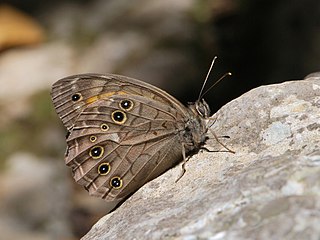
Siddhartha Gautama, most commonly referred to as the Buddha, was a wandering ascetic and religious teacher who lived in South Asia during the 6th or 5th century BCE and founded Buddhism.

Death is the irreversible cessation of all biological functions that sustain an organism. For organisms with a brain, death can also be defined as the irreversible cessation of functioning of the whole brain, including the brainstem, and brain death is sometimes used as a legal definition of death. The remains of a former organism normally begin to decompose shortly after death. Death is an inevitable process that eventually occurs in all organisms. Some organisms, such as Turritopsis dohrnii, are biologically immortal. However, they can still die from other means than aging.

Extraterrestrial life or alien life is life which may occur outside Earth and which did not originate on Earth. No extraterrestrial life has yet been conclusively detected. Such life might range from simple forms such as prokaryotes to intelligent beings, possibly bringing forth civilizations that might be far more advanced than humanity. The Drake equation speculates about the existence of sapient life elsewhere in the universe. The science of extraterrestrial life is known as astrobiology.

Helen Adams Keller was an American author, disability rights advocate, political activist and lecturer. Born in West Tuscumbia, Alabama, she lost her sight and her hearing after a bout of illness when she was 19 months old. She then communicated primarily using home signs until the age of seven, when she met her first teacher and life-long companion Anne Sullivan. Sullivan taught Keller language, including reading and writing. After an education at both specialist and mainstream schools, Keller attended Radcliffe College of Harvard University and became the first deafblind person in the United States to earn a Bachelor of Arts degree.

Life is a quality that distinguishes matter that has biological processes, such as signaling and self-sustaining processes, from matter that does not, and is defined by the capacity for growth, reaction to stimuli, metabolism, energy transformation, and reproduction. Various forms of life exist, such as plants, animals, fungi, protists, archaea, and bacteria. Biology is the science that studies life.

Simon & Garfunkel were an American folk rock duo consisting of the singer-songwriter Paul Simon and the singer Art Garfunkel. They were one of the best-selling music groups of the 1960s, and their biggest hits, including "The Sound of Silence" (1965), "Mrs. Robinson" (1968), "The Boxer" (1969), and "Bridge over Troubled Water" (1970), reached number one on singles charts worldwide.

Sir David Frederick Attenborough is a British broadcaster, biologist, natural historian and author. He is best known for writing and presenting, in conjunction with the BBC Natural History Unit, the nine natural history documentary series forming the Life collection, a comprehensive survey of animal and plant life on Earth.
Life imprisonment is any sentence of imprisonment for a crime under which convicted criminals are to remain in prison for the rest of their lives or indefinitely until pardoned, paroled, or otherwise commuted to a fixed term. Crimes that warrant life imprisonment are usually violent and/or dangerous. Examples of crimes that result in life sentences are murder, torture, terrorism, child abuse resulting in death, rape, espionage, treason, drug trafficking, drug possession, human trafficking, severe fraud and financial crimes, aggravated criminal damage, arson, kidnapping, burglary, and robbery, piracy, aircraft hijacking, and genocide, crimes against humanity, war crimes, severe cases of child pornography, or any three felonies in case of three-strikes law.

The Human Development Index (HDI) is a statistical composite index of life expectancy, education, and per capita income indicators, which is used to rank countries into four tiers of human development. A country scores a higher level of HDI when the lifespan is higher, the education level is higher, and the gross national income GNI (PPP) per capita is higher. It was developed by Pakistani economist Mahbub ul-Haq and was further used to measure a country's development by the United Nations Development Programme (UNDP)'s Human Development Report Office.

The Satyrini is one of the tribes of the subfamily Satyrinae. It includes about 2200 species and is therefore the largest tribe in the subfamily which comprises 2500 species.

Kirinia roxelana, the lattice brown, is a butterfly of the family Nymphalidae. It is found in southeastern Europe and the Near East. The butterfly is on wing between May and July. The larvae feed on various grasses.
Parargina is a subtribe of butterflies of the subfamily Satyrinae.

Kirinia epimenides is a butterfly in the family Nymphalidae (Satyrinae). It is found in the East Palearctic in Amur, eastern China, Korea, Ussuri, Japan.

Kirinia climene, the Iranian Argus, is a butterfly of the family Nymphalidae. It was described by Eugenius Johann Christoph Esper in 1783. It is distributed in Bulgaria, Romania, Yugoslavia, Macedonia, Turkey, Caucasus, Transcaucasia, Syria, Iraq, Iran and southern Russia.

Kirinia epaminondas is a Palaearctic butterfly of the family Nymphalidae. It was described by Otto Staudinger in 1887.
Esperia is a municipality in Italy.













